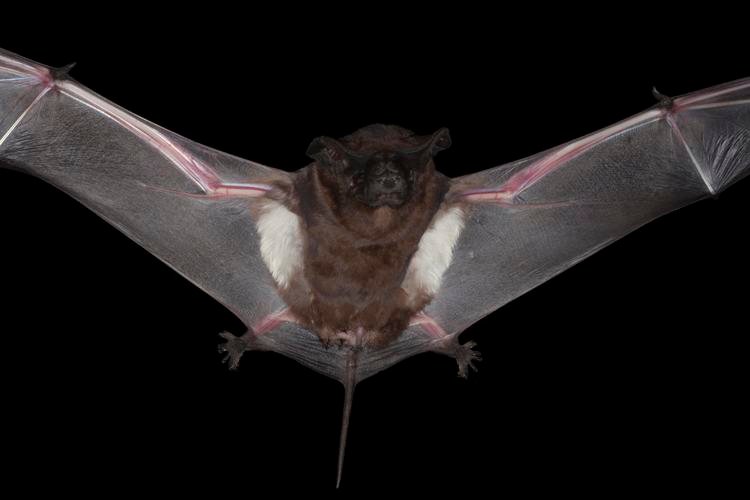Bats: Frequently Asked Questions

Many customers have questions about the bat removal and exclusion process. Animals Happens has compiled a list of the most bat questions to help educate homeowners with their first bat infestation.
How Can Bats Get In The Attic?
Bats gain access to homes by squeezing through cracks in the roof, uncapped chimneys, roof vents, missing roof shingles, and fascia boards. Once these critters enter the attic, they will wreak havoc on the home’s building materials. Animals Happen can connect you with bat exclusion experts to identify possible entry points and perform the necessary repairs to prevent bats from entering the home.
Learn More: What Entry Points Will Bats Use To Enter A Home?
Will Bats Cause Damage In The Attic?
Bats in the attic can cause corrosion, wood decay, and stains. Guano deposits, formed by bat droppings, can harm and degrade the structure of your home. Insulation can be quickly damaged by bat latrines or areas where they use to go to the bathroom. Therefore, it’s imperative to begin bat removal at the first signs of an infestation.
Learn More: Is The Damage In My Attic Caused By Bats?
How Long Will Bats Remain In An Attic?
If you suspect you have a bat colony that has infested your home, you must act quickly to eliminate them. Contact Animals Happens to speak with a bat control expert to learn more about bats or to discuss exclusion work that will prevent bat infestations. Bats can live for 10 to 20 years on average because they are active at night, avoiding most predators. The bats may never leave if they are provided shelter, protection, and food sources.
Learn More: Will Bats Leave The Attic On Their Own?
How To Prevent Bats From Entering An Attic?
The only way to keep bats from entering a building is to physically prevent them from getting in through holes, gaps, and cracks via bat-proofing. Bat exclusion experts can make sure the vents and chimney caps are in good working order and will perform repairs if damaged. Bat Control Professionals service all residential, commercial, and non-residential properties, including schools, churches, apartments, and arenas.
Learn More: How To Keep Bats Out?
Should An Attic Be Decontaminated After A Bat Infestation?
If your home contains a lot of bat droppings, we recommend hiring a professional to clean them up for you. The risk of contracting diseases is too significant to attempt at home guano decontamination. Instead, contact wildlife control professionals to perform safe bat control and clean-up services.
Learn More: How To Clean Up After Bats Have Entered The Attic?
Will Homeowner’s Insurance Cover Bat Damage?
Your insurance policy and the damage circumstances will determine whether bat damage and infestations are covered. Most home insurance companies will cover damage that is sudden and accidental, but maintenance issues such as bats entering the attic through a poorly maintained roof are often not covered. Talk to your insurance agent for more information on what type of policies cover bat problems.
Learn More: Will My Insurance Cover Bat Exclusion?
How Much Does Bat Removal Cost?
Cost of removing a small colony of bats ranges from $400 to $600. Inspection and guano cleanup costs can add up to $8,500 for larger colonies. If you only have one bat instead of a colony, it will be less expensive, costing around $275 to remove a single bat. Every infestation is different and requires a different amount of materials and alterations.
Learn More: What Determines The Cost Of Bat Control Services?
How Many Bats Live In A Single Attic?
Bats roost in trees, caves, mines, attic, and garages. Colonies can contain anywhere from 100 to several thousand individuals. Exclusion works the same in large colonies as it does with smaller infestations. A wildlife technician may install multiple exclusion devices to speed up the process.
Learn More: How large Are Bat Colonies?
Can Bats Spread Diseases To Humans?
Large flocks of roosting bats may pose a health risk to those who live nearby. Disease organisms that can grow in the nutrient-rich accumulations of bat droppings (guano), urine, and debris under a roost pose the most significant health risk. If the spores from the droppings are inhaled, histoplasmosis can easily be contracted. That why its advised only trained wildlife control professionals conduct bat guano decontamination services.
Learn More: Which Diseases Do Bats Transmit?
Have A Question We Didn’t Address?
If you have a question we didn’t touch upon, contact us via email or Call Us, and one of our expert wildlife technicians will be able to help you out. We understand that pests in the home can be off-putting and we’re willing to help in any way possible.
